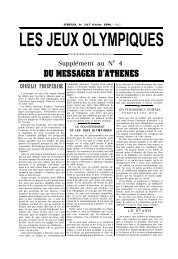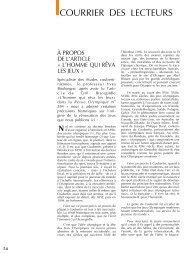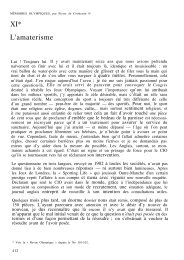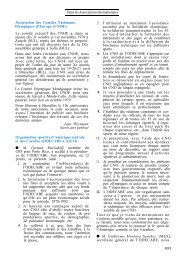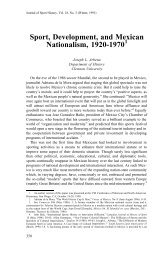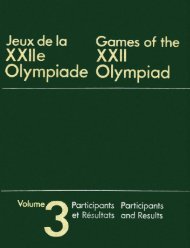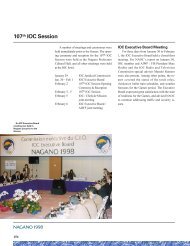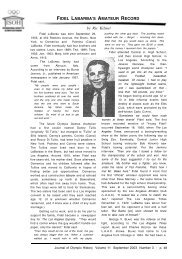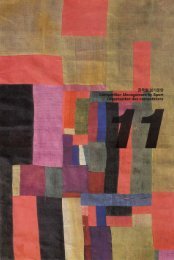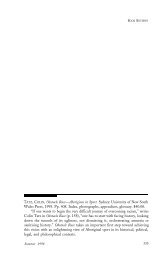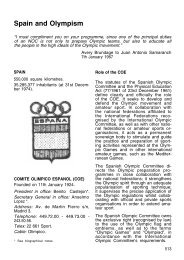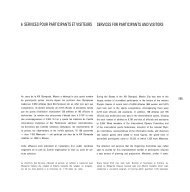Sport and Colonialism in 19th Century Australasia - LA84 Foundation
Sport and Colonialism in 19th Century Australasia - LA84 Foundation
Sport and Colonialism in 19th Century Australasia - LA84 Foundation
You also want an ePaper? Increase the reach of your titles
YUMPU automatically turns print PDFs into web optimized ePapers that Google loves.
of endeavour: not just sport. Great lawyers, Prime M<strong>in</strong>isters,<br />
<strong>and</strong> lead<strong>in</strong>g figures <strong>in</strong> the community played down the cult of<br />
personality. There has been with<strong>in</strong> New Zeal<strong>and</strong> a resound<strong>in</strong>g<br />
display of egalitarianism, that cont<strong>in</strong>ues up to the present day.<br />
When Sir Keith Holyoake died <strong>in</strong> 1983, an obituary notice, on<br />
New Zeal<strong>and</strong>'s second-longest-serv<strong>in</strong>c Prime M<strong>in</strong>ister, captured<br />
the "common touch,, that permeates so much of the fabric of<br />
society.<br />
Dur<strong>in</strong>g the short walk from his official residence to<br />
Parliament each morn<strong>in</strong>g he stopped at three or four<br />
shops... to talk on the matters of the day <strong>and</strong> what<br />
would w<strong>in</strong> the big race on Saturday... The ease with<br />
which ord<strong>in</strong>ary New Zeal<strong>and</strong>ers could approach him<br />
seems almost unbelievable...the Prime M<strong>in</strong>ister's<br />
number was <strong>in</strong> the phone book. He would take a call,<br />
even from a Saturday-night drunk. 22<br />
"Play Up <strong>and</strong> Play the Game,, was one of a number of British<br />
aphorisms of the n<strong>in</strong>eteenth century that illustrate how sport<br />
became an expression of a national <strong>and</strong> religious ethos. The<br />
athletic emphasis, however competitive the game, was to play<br />
well not necessarily to w<strong>in</strong>. The difference for colonial New<br />
Zeal<strong>and</strong> was that the dom<strong>in</strong>ant social activity was not cricket,<br />
a uniquely English synthesis of sport <strong>and</strong> morality but rugby.<br />
Cricket had always provided the analogy for the game of life-,,<br />
. . . it's more than a game. It's an <strong>in</strong>stitution". 23<br />
Cricket became<br />
the sport of the Empire <strong>and</strong> carried its ethical values<br />
with it. The phrases "fair play", "not cricket", <strong>and</strong> "a sticky<br />
wicket,, were used as familiarly by an educated Indian <strong>and</strong> outback<br />
Australian on vast sheep-stations, as they were by an<br />
English schoolboy. 24<br />
In New Zeal<strong>and</strong> schools sport was taught<br />
<strong>and</strong> organised as if at British facsimile public schools. 25<br />
However, New Zeal<strong>and</strong> school graduates were not go<strong>in</strong>g out to the<br />
massive network of the colonies <strong>and</strong> the British Empire. They<br />
stayed at home, worked hard <strong>and</strong> played harder. Why was it that<br />
rugby football became the ethical examplar of New Zeal<strong>and</strong> social<br />
<strong>and</strong> spiritual life? The game had skill <strong>and</strong> courage, <strong>and</strong> physical<br />
violence, <strong>and</strong> physical contact. Moreover, it was a game<br />
with s<strong>in</strong>gular structural properties. Not only did classes meet,<br />
they were crushed together <strong>and</strong> bumped about. Lansbury sees the<br />
critical feature as "class" <strong>and</strong> argues the case that cricket<br />
"susta<strong>in</strong>ed the class structure of English society". 26<br />
If this<br />
74



